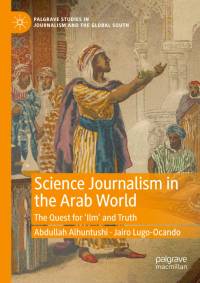Om Science Journalism in the Arab World
This book examines the main issues and challenges that science journalism faces in the MENA region while analyzing how journalists in these countries cover science and engage with scientists. Most countries in the Middle East and North Africa region have set an ambitious goal for 2030: to transform their societies and become knowledge economies. This means modernizing institutions and encouraging people to embrace Science, Technology, Engineering and Mathematics as part of their daily lives. This books claims that the main vehicle to achieve this goal is science news reporting, as it continues to be the main platform to disseminate scientific knowledge to the general public. Simultaneously, it is also poorly equipped to achieve this task. Interviewing dozens of journalists, the authors looked at specific areas such as the gender divide and its effects on science news reporting as well as the role of religion and culture in shaping journalism as a political institution. The authors conclude that traditional normative assumptions as to why science reporting does not live up to expectations need to be reviewed in light of other more structural problems such as lack of skills and specialization in science communication in the region. In so doing, the book sets out to understand the past, present and future of science news in one of the most challenging regions in the world for journalists.
Visa mer

